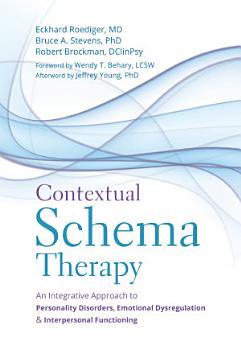Contextual Schema Therapy: An Integrative Approach to Personality Disorders, Emotional Dysregulation, and Interpersonal Functioning
About this ebook
ST is a powerful, integrative treatment model that combines aspects of cognitive, behavioral, and psychodynamic therapies. It has proven highly effective in treating a number of mental health issues, including difficult-to-treat personality disorders. ST’s main premise is that mental health issues arise as a result of unmet emotional needs in childhood, leading to the development of early maladaptive schemas (EMS). But, more and more, ST has shifted away from EMS to focus on schema content—that is, changing the way clients relate to their experiences and to others.
This book incorporates the latest findings in contextual behavioral science with a focus on clients’ coping styles—or schema modes—and improving interpersonal functioning. The book includes exercises from compassion-focused therapies, acceptance and commitment therapy (ACT), and even functional analytic psychotherapy (FAP) to help your clients become more aware of their own unhealthy coping patterns and behaviors. You’ll also discover a range of emotion-focused and experiential techniques to use in therapy with your client.
Ratings and reviews
About the author
Eckhard Roediger, MD, is director of the Frankfurt Schema Therapy Institute, the first established in Germany. He is former president of the International Society of Schema Therapy (ISST), and board member since its foundation in 2008. He has been a schema therapy trainer and supervisor since 2008, and is author of numerous books, book chapters, and articles about schema therapy in German.
Bruce A. Stevens, PhD, is current Wicking Chair of Ageing and Practical Theology at Charles Sturt University in Canberra, Australia. He is a clinical and forensic psychologist with over twenty years of private practice experience. He has written several books—including two other books on schema therapy—and he has advanced accreditation in schema therapy for both individuals and couples.
Robert Brockman, DClinPsy, is an experienced clinician and academic working out of Sydney, Australia. He is a senior trainer with Schema Therapy Training Australia where he regularly runs ISST-accredited schema therapy training courses throughout Australia, New Zealand, and Asia. Brockman also currently holds a research fellowship with the Institute for Positive Psychology and Education at Australian Catholic University where he researches psychological approaches to well-being. He is currently engaged in clinical research focused on extending the schema mode model into novel clinical populations (e.g., generalized anxiety disorder (GAD), chronic pain, eating disorders, psychosis, HIV sufferers, problem gamblers, and forensic patients).
Foreword writer Wendy T. Behary, LCSW, is founder and clinical director of The Cognitive Therapy Center of New Jersey, and a faculty member at the Cognitive Therapy Center and Schema Therapy Institute of New York. She is also a distinguished founding fellow of the Academy of Cognitive Therapy. She maintains a private practice specializing in narcissism and high-conflict couples therapy.
Afterword writer Jeffrey Young, PhD, is author of Schema Therapy, and founder and director of the Schema Therapy Institute of New York.






